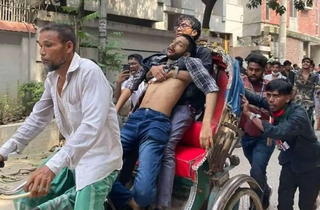The protests, which have been ongoing for over two weeks, have turned deadly, with reports of 20 students killed in clashes with police and government supporters, according to information obtained by ILKHA.
Prime Minister Sheikh Hasina condemned the killing of demonstrators in a nationally broadcast speech, promising that those responsible, regardless of political affiliation, would be held accountable. However, Students Against Discrimination, the primary organization behind the protests, criticized her remarks as insincere and urged supporters to continue their stand.
The current quota system fills more than half of the 1.9 million civil servant positions in Bangladesh through affirmative action policies, prioritizing women, residents of underdeveloped districts, and other disadvantaged groups. A contentious element of this system is the 30% reservation for descendants of freedom fighters from the 1971 liberation war. This quota system, implemented by Sheikh Mujibur Rahman in 1972, was partially reduced in response to student protests in 2018. However, a recent High Court ruling declared the modification unlawful and mandated the reinstatement of the freedom fighter category.
Students argue that the quota system is misused to fill government positions with supporters of Hasina's Awami League party, depriving them of fair employment opportunities. Civil service jobs offer stable, lifelong employment, making them highly sought after.
The current unrest follows a history of political crackdowns under Hasina's administration, including the execution of prominent figures from the Jamaat-e-Islami movement in 2010 and the prosecution of officials accused of collaborating with Pakistan during the 1971 conflict. In January, Hasina, 76, secured her fourth term in a general election criticized for a severe crackdown on political opponents, many of whom boycotted the vote. (ILKHA)



 Dünya
Dünya
 Güncel
Güncel
 Güncel
Güncel
 Güncel
Güncel
 Dünya
Dünya
 Güncel
Güncel
 Röportaj
Röportaj
 Dünya
Dünya
 Dünya
Dünya
 Güncel
Güncel





